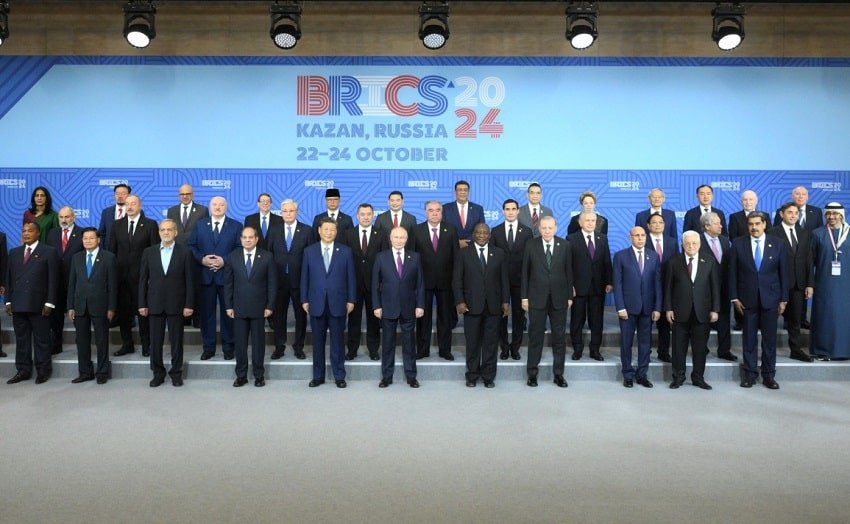Mirza Abdul Aleem Baig
The failure to secure BRICS membership at the 2024 Summit raises pressing questions about Pakistan’s foreign policy strategy and its effectiveness in navigating the complex global landscape. While Pakistan’s exclusion from BRICS cannot be attributed solely to diplomatic missteps, it does reveal underlying issues in Pakistan’s foreign policy approach that have left it out of an influential bloc of emerging economies.
BRICS, which initially comprised of Brazil, Russia, India, China, and South Africa, has positioned itself as a counterweight to Western-dominated global institutions, offering a platform for countries seeking greater autonomy in financial and geopolitical affairs. BRICS welcomed new members like Egypt, Ethiopia, Iran, Saudi Arabia, and the UAE, signaling its openness to expansion and increased global influence. For Pakistan, the failure to secure a place in this expanded BRICS alliance signals a missed opportunity that reflects both internal and external policy shortcomings.
A critical factor affecting Pakistan’s exclusion is its strained relationship with India, a founding member of BRICS. As regional rivals with long-standing geopolitical tensions, India and Pakistan have frequently clashed in multilateral forums. India’s prominent role within BRICS, combined with the organization’s consensus-driven decision-making model, means that Pakistan’s entry would have required India’s tacit approval – an unlikely scenario given their contentious history. Effective foreign policy is often measured by a nation’s ability to navigate and influence such geopolitical challenges, and Pakistan’s failure to improve regional relationships, especially with India, has undeniably limited its diplomatic reach and hindered its chances for BRICS membership.
Also Read: Xi’s BRICS Trip Strengthens Global South Unity: China
Similarly, Pakistan’s economic dependency on international financial institutions like the IMF runs counter to BRICS’s vision of financial independence. BRICS countries have championed economic resilience and autonomy, launching initiatives such as the New Development Bank to reduce dependence on the U.S. dollar and Western financial institutions. Pakistan’s frequent recourse to IMF bailouts and its ongoing struggles with economic instability make it an ill fit for a bloc that prioritizes financial sovereignty. From a foreign policy perspective, this economic reliance reflects Pakistan’s challenges in creating sustainable economic growth – a critical aspect that impacts its international standing and limits its appeal to alliances built on financial independence.
Pakistan’s domestic instability and internal governance issues further complicate its foreign policy ambitions. The political and social volatility within Pakistan, marked by security concerns, portrays a nation that lacks the stability BRICS seeks in new members. Successful foreign policy is often underpinned by a stable domestic environment, as this stability enables a country to project strength and reliability on the global stage. For Pakistan, internal challenges have hindered its ability to fulfill this aspect of foreign policy, raising questions about its capacity to make consistent contributions to international alliances like BRICS.
Also Read: BRICS Leaders Issue Joint Declaration
Another factor affecting Pakistan’s exclusion is its strategic alignment and foreign alliances. While BRICS aims to create a counterweight to Western influence, Pakistan’s historical alliances, particularly with Western powers, complicate its positioning within BRICS. Although Pakistan has shown interest in joining BRICS, it has not shifted its policies to align closely with BRICS’s goals of reforming global financial structures and promoting non-Western cooperation. Effective foreign policy demands adaptability to changing geopolitical dynamics, and Pakistan’s failure to signal a decisive strategic alignment with BRICS’s vision reflects a missed opportunity to build the alliances necessary for membership.
Pakistan’s exclusion from BRICS does not signify a singular failure, but it does highlight areas where its foreign policy could be more cohesive, forward-looking, and adaptable. For Pakistan to build stronger diplomatic ties and enhance its standing in international forums, it would need to adopt a more strategic approach to both regional relations and economic policy. Improved relations with India, reduced economic dependency on Western financial aid, and efforts to stabilize its internal political landscape could all bolster Pakistan’s appeal to influential blocs like BRICS.
The failure to secure BRICS membership underscores significant shortfalls in Pakistan’s foreign policy strategy. By not effectively addressing its geopolitical, economic, and internal challenges, Pakistan has missed a valuable opportunity to join an emerging global alliance that aligns with its aspirations for economic growth and regional influence. If Pakistan seeks future membership in BRICS, it must prioritize these areas and adopt a foreign policy that is both proactive and adaptable to the changing dynamics of global alliances.
The views expressed in this article are those of the author and do not necessarily reflect the official stance of The Diplomatic Insight or its editorial board. The content is provided for informational purposes only and should not be construed as an endorsement of any particular viewpoint, policy, or action.
The Diplomatic Insight is a digital and print magazine focusing on diplomacy, defense, and development publishing since 2009.



